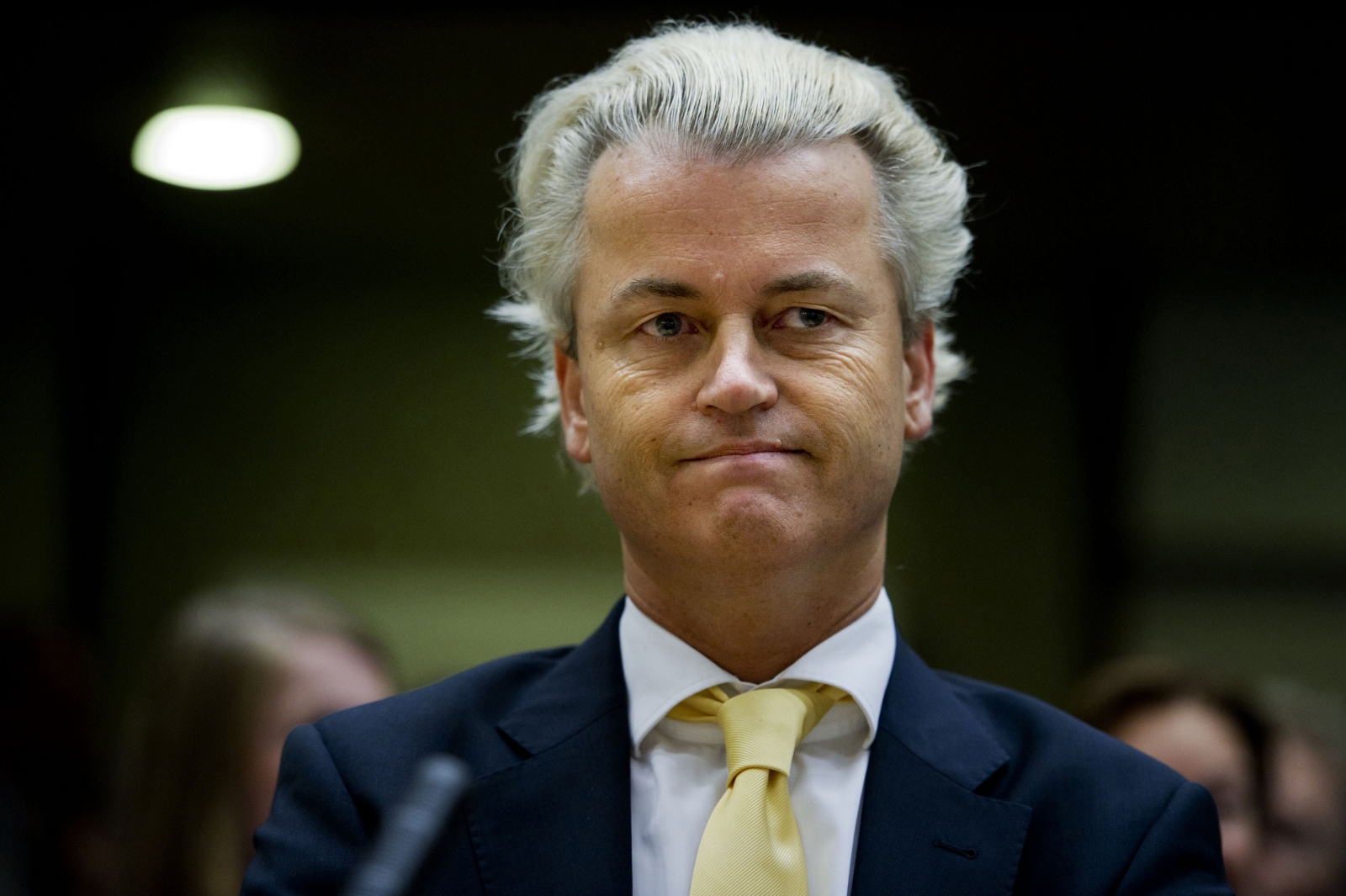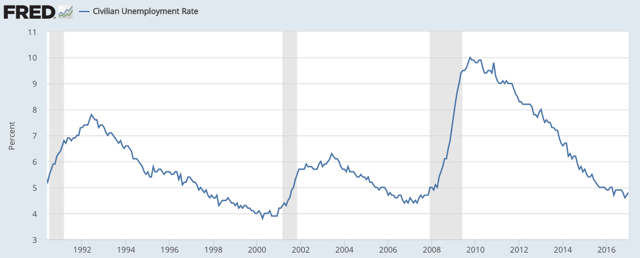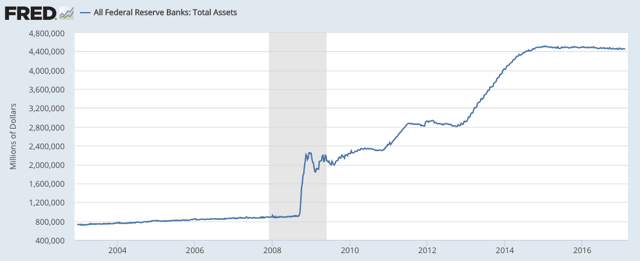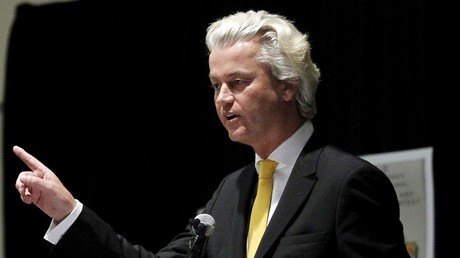The article below, published by
Seeking Alpha, has staggering news for those who are not familiar with the data and the analysis it presents. Let me highlight a few paras:
- Over
the past eight years, US economic growth and real wages have
underperformed expectations, yet the stock market has tripled in value.
- Since Q1 2009, nominal GDP has been
up 31% (17% in real terms), real wages have picked up
less than 1%,
- One
could argue that central bank policies are socially non-optimal in that
they reward those who are well off (people who have the ability to buy
stocks and/or real estate) at the expense of those who are savers
(retirees, conservative investors) - who now make little to nothing off
interest - and those unable to invest in risky assets due to a lack of
disposable income. Widening income disparity can breed social conflict
and could be at least be partially attributed to the surprising
electoral outcomes of Brexit, Trump, and possibly additional
unanticipated results in the upcoming European presidential elections in
France, Germany, the Netherlands, and potentially Italy.
Summary
Over
the past eight years, US economic growth and real wages have
underperformed expectations, yet the stock market has tripled in value.
Main
influences include an initially oversold market in 2009, central bank
policies, and heavy credit expansion at the corporate and government
level.
The market’s current price point suggests an overbought market with risk skewed to the downside.
However,
a continuation of negative real rates and additional credit expansion
may continue to provide for a bullish short-/medium-term outlook.
Argument:
The past eight years have provided one of the best bull markets in
history despite one of the weakest expansions out of a recession in
history. It's my belief that the US equities market, taken as a whole,
should be avoided from a value perspective, although I recognize that a
continuation of low rates, further credit expansion, and earnings growth
from upcoming fiscal measures could continue to support higher
valuations.
Overview
Since Q1 2009, nominal GDP has been
up 31% (17% in real terms), real wages have picked up
less than 1%, yet the S&P 500 (NYSEARCA:
SPY)
has tripled.
If this article were to be delayed until the second week in March, and
the S&P 500 stays at its current valuation, the rise over the past
eight years will come to a factor of 3.4x - 240%, or 16.5% annualized.
This compares to 3.4% annualized in nominal GDP appreciation, or a
spread of about 13%.
This is a massive discrepancy
that shows that the rise in the US equity markets has been a product of
far more than basic economic growth. Some contributing factors:
1. The S&P was oversold when running below 700 in March 2009
Markets
tend to oversell in times of panic. Fear is a stronger emotion than
greed, and losses tend to hurt far more than gains from a psychological
perspective. Investors pulled their money out of funds in record
quantities and were far undercapitalized when there was a grand
opportunity to snap up many highly underpriced assets. Even though the
crisis was mostly cleaned up by the end of 2008, the market continued to
sell off for another 10-11 weeks after before starting to reverse
course.
The same type of lagging
phenomenon is seen with unemployment, where companies don't begin
rehiring until they're absolutely certain the economy is continuing on
an upward trajectory. Consequently, unemployment always spikes after
a recession rather than during. This explains why U-3 unemployment
peaked in October 2009 at 10%, and didn't fall below 8% until September
2012, a full four years after the worst of the recession, when
unemployment in the fall of 2008 was only 6.1%.
(Source: US Bureau of Labor Statistics; modeled by fred.stlouisfed.org)
2. Low interest rates
This
is a no-brainer with its effect in calculating the value of a business,
which is the amount of cash that can be taken from it over its life
discounted back to the present. The cost of capital is used as the
discount rate. The cost of debt (a portion of the cost of capital) is
lower with lower rates, and is tax deductible assuming the business is
profitable and pays taxes. This compresses discount rates and boosts
corporate valuations even if the numerator term - cash flows, of which a
large portion is earnings - stays constant.
Each
100-bp reduction in the cost of debt projects to increase corporate
valuations by 5%-6%, based on the current financial and capital profile
of the overall US equities market. If cheaper debt also creates the
incentive to take on more debt as a portion of the overall capital
structure, the valuation increase could be even higher assuming the
accretive effects of the relative cheapness of the capital source offset
the additional insolvency risk.
3. Quantitative easing ("QE")
Another
no-brainer, but fundamentally important. Quantitative easing works
through a mechanism by which cash is printed and a central bank uses
that cash to buy a bond or other form of security. This bids down yields
in those assets by reducing their supply in the market and forces
market participants out over the risk curve into riskier assets, such as
stocks and real estate, in order to chase the higher returns of these
assets. This bids up their prices and expects to create a windfall of
wealth that will in turn be spent in the economy in order to drive
growth.
The US Federal Reserve
expanded its balance sheet from $910 billion as of August 2008 (before
the fall of Lehman) to $4.5 trillion as of December 2014, a factor of
5x, where it's mostly stayed since.
(Source: Board of Governors of the Federal Reserve System; modeled by fred.stlouisfed.org)
One
could argue that central bank policies are socially non-optimal in that
they reward those who are well off (people who have the ability to buy
stocks and/or real estate) at the expense of those who are savers
(retirees, conservative investors) - who now make little to nothing off
interest - and those unable to invest in risky assets due to a lack of
disposable income. Widening income disparity can breed social conflict
and could be at least be partially attributed to the surprising
electoral outcomes of Brexit, Trump, and possibly additional
unanticipated results in the upcoming European presidential elections in
France, Germany, the Netherlands, and potentially Italy.
(...)
 BRUXELLES
BRUXELLES Il
ministro dell’Economia, Pier Carlo Padoan (a sinistra) con il
presidente dell’Eurogruppo, il ministro delle Finanze danese Jeroen
Dijsselbloem, alla riunione dell’Eurogruppo del 20 febbraio 2017 (Epa)
Il
ministro dell’Economia, Pier Carlo Padoan (a sinistra) con il
presidente dell’Eurogruppo, il ministro delle Finanze danese Jeroen
Dijsselbloem, alla riunione dell’Eurogruppo del 20 febbraio 2017 (Epa)












